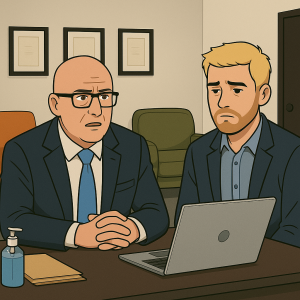1. Victim and Witness Rights
- South Dakota Office of the Attorney General – Victim Services
Provides guidance on victim rights, restitution, victim advocacy, and participation in the legal process. - South Dakota Crime Victims’ Compensation Program
Offers reimbursement for medical, counseling, relocation, and other expenses related to victimization.
2. Free and Low-Cost Legal Aid Programs
- Dakota Plains Legal Services
Provides free civil legal assistance to low-income and Native communities, including domestic violence, harassment, and stalking cases. - State Bar of South Dakota – Public Services
Offers legal aid referrals, lawyer directory access, and basic self-help resources for civil protection and abuse issues.
3. Relevant Laws
- Stalking: S.D. Codified Laws § 22-19A-1
What it means: Intentional and repeated conduct that causes someone to fear injury or death. Covers in-person and electronic monitoring or harassment. - Harassment: Addressed under stalking and telecommunications statutes (e.g., § 49-31-31)
What it means: Includes threatening or obscene messages sent via phone or electronic means. Can be prosecuted with related stalking or intimidation charges. - Bullying: No adult criminal statute. Covered under S.D. Codified Laws § 13-32-15 (School Code)
What it means: Public schools are required to implement anti-bullying and cyberbullying policies. These include reporting, intervention, and education requirements. - Defamation: Civil tort, not criminal. Based on South Dakota case law.
What it means: Libel or slander lawsuits may be filed when false statements cause harm. South Dakota does not criminalize defamation.
4. Reporting and Hotlines
- Call 911 if you are in danger or need emergency assistance.
- Report non-emergency situations to your local police or sheriff’s office.
- South Dakota Coalition Ending Domestic and Sexual Violence
Connects survivors with local programs offering shelter, legal advocacy, and crisis intervention. - Statewide Domestic Violence Hotline: 1-800-692-7385
Offers 24/7 confidential support, shelter access, and legal guidance.
5. Support Organizations
- South Dakota Coalition Ending Domestic and Sexual Violence
A statewide network supporting survivors through legal services, safe housing, and culturally appropriate resources. - Working Against Violence, Inc. (WAVI)
Provides shelter, legal advocacy, and trauma support in Rapid City and surrounding areas.
6. Civil Remedies and Protection Orders
South Dakota residents may request Protection Orders for stalking, harassment, or domestic abuse. These orders prohibit contact, proximity, or digital communication and can be enforced statewide. Legal aid organizations and court staff can help complete and file the required forms.
Important Note on Jurisdiction: If the individual you are seeking a restraining order against lives in a different state, your local court may not have jurisdiction to enforce that order. In most cases, you must file for protection in the state where that individual resides or where the conduct occurred. This applies even in situations involving online harassment, defamation, or stalking. Contact legal aid services in both your state and the other person’s state for guidance.
7. Youth and School Resources
- South Dakota Department of Education – Bullying Prevention
Provides policy guidance, reporting protocols, and anti-bullying training materials for schools and educators.
8. Court Forms and Filing Help
- South Dakota Unified Judicial System – Protection Orders
Offers downloadable forms, filing instructions, and procedural guidance for civil protection orders.
9. Online Safety and Privacy Tools
- NNEDV Tech Safety Toolkit
A resource hub for managing digital privacy, preventing online abuse, and responding to cyberstalking.
Disclaimer: This information is provided for educational purposes only and does not constitute legal advice.




